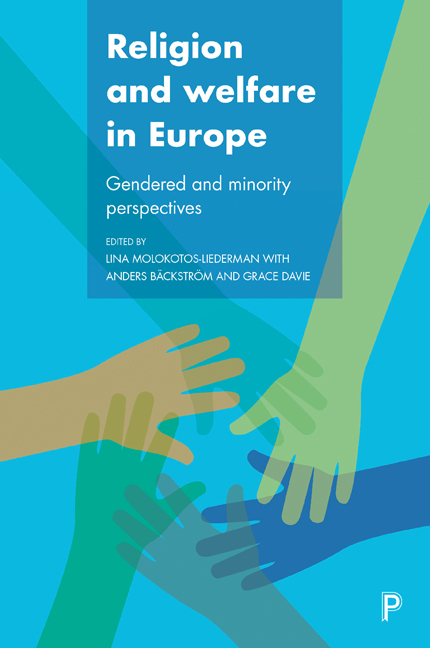Book contents
- Frontmatter
- Contents
- List of tables, figures and maps
- Acknowledgements
- Notes on contributors
- one Introduction
- Part One Thinking methodologically: approaches to research and practice
- Part Two Thinking regionally: key case studies in welfare and religion in Europe
- Part Three Gendered and minority perspectives
- Part Four Drawing the threads together
- Appendix: the WaVE team
- Index
Six - The intersections of state, family and church in Italy and Greece
Published online by Cambridge University Press: 05 April 2022
- Frontmatter
- Contents
- List of tables, figures and maps
- Acknowledgements
- Notes on contributors
- one Introduction
- Part One Thinking methodologically: approaches to research and practice
- Part Two Thinking regionally: key case studies in welfare and religion in Europe
- Part Three Gendered and minority perspectives
- Part Four Drawing the threads together
- Appendix: the WaVE team
- Index
Summary
Introduction
This chapter focuses on the intersection of state, family and church in southern Europe, based on the examples of Italy and Greece and the findings of the Greek and Italian case studies from the Welfare and Values in Europe: Transitions Related to Religion, Minorities and Gender (WaVE) project. Although our starting point is the WaVE case studies, we examine them in the context of the current situation to highlight recent socioeconomic and political developments since the completion of the project in 2009, notably the escalation of both the economic crisis and the refugee crisis since 2012. We draw our data from both the WaVE Greek and Italian case studies and additional materials on the responses to the economic crisis of majority churches: the Catholic Church in Italy and the Orthodox Church in Greece.
We first examine the shared characteristics between the Greek and Italian situation, compared with northern and western Europe. These consist of common cultural, social, economic and political traits and legacies, including asymmetrical paths to modernisation, uneven development of the welfare state and social policy, the importance of the family in the context of the 2009 economic crisis and recent waves of immigration.
We then look at the specificities of the Greek and Italian cases, first in terms of the size and development of their economies, and more specifically in terms of the different scales of economy. (Although both countries have significant agricultural production and tourism, Italy, compared with Greece, is the third largest economy in the Eurozone and a G7 member with much higher industrial production and exports.) We also examine their distinctive religious traditions, especially in relation to the delivery of social welfare, with the aim of exploring how the similarities and differences between Greece and Italy are translated and reflected in majority churches’ responses to the recent economic and immigration crisis. Specifically, in the Italian case with regard to Catholicism, the principle of subsidiarity and the development of social action have developed in different ways from the Christian Orthodox concept of diaconia and its particular approach to social service.
- Type
- Chapter
- Information
- Religion and Welfare in EuropeGendered and Minority Perspectives, pp. 107 - 134Publisher: Bristol University PressPrint publication year: 2017



